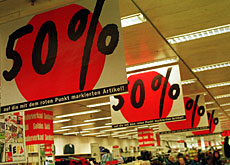
Swiss deflation fears intensify

Amid falling growth rates and an inflated Swiss franc, economists have warned that the threat of deflation in Switzerland has again become real.
Although opinions are divided about whether Switzerland will fall into a deflationary spiral, most agree that a sustained period of falling prices would be traumatic.
“Whether from an external shock or from deterioration in the domestic economy, Switzerland is facing a fairly substantial risk of deflation,” analyst Jean-Claude Manini said in a recent report on the subject for the bank, Lombard Odier Darier Hentsch & Cie.
Stephane Garelli, from the Lausanne-based business school IMD, told swissinfo that, “the timing would be terrible”.
“If you look at the past ten years, Switzerland has had only one year where growth was above three per cent, and that was in 2000,” he added.
“We already have a problem with growth…so we don’t need deflation.”
A chief worry is that the moribund German economy, which accounts for the lion’s share of Swiss exports, as well as an over-valued Swiss franc, could tip the country’s sluggish growth rate into a negative trend.
Both factors are reasons behind the Swiss economics ministry’s decision last month to downgrade its national growth forecast for 2003 to zero.
Unemployment risk
Conventional economic theory has long associated deflation with rising unemployment, ever since the great depression of the late 1920s and 1930s when falling prices forced firms to sack millions of people.
Garelli points out that when prices fall during a period of deflation, companies have no choice but to cut costs.
“And the only way to do that is by reducing salaries or making people unemployed,” he said.
When accompanied by high levels of debt, the effect can be accelerated. Just as inflation tends to nibble away at debt, deflation intensifies it.
“If your revenues go down, it’s much more difficult to service your debt,” Garelli said.
Franc still too high
While the current global debate about the threat of deflation has focussed on Germany, the United States and Japan, where it has already taken hold, Switzerland is also vulnerable.
Its biggest threat is the Swiss franc, which Manini said, “is clearly overvalued”.
Because the Swiss economy is so dependent on the global economic situation, and has little scope to influence it, movements in the value of the euro remain critical for the Swiss.
If the franc appreciates against the euro, Swiss companies will struggle to export to key European markets.
“We definitely have a policy to manage our exchange rate to the euro, and not the dollar,” observed Garelli.
No export-led recovery in sight
Although Switzerland has long been accustomed to very modest rates of growth, Garelli said international trends over the last 15 years has made the current economic situation particularly precarious.
“Deflation is already taking place in computers, telecommunications, the car industry and whenever products are manufactured on an international scale.”
Being able to manufacture at the lowest cost location around the world is one of the advantages of globalisation.
“We are getting used to international prices going down. [But now] we are much more worried about the fact that the Swiss franc is getting more and more expensive,” Garelli added.
“We will therefore have difficulty in re-launching the economy by hoping to sell more abroad.
“In addition, Germany is having tremendous problems and may go into deflation.
No more ammunition
What keeps economists awake at night is the fact that Swiss policy makers have little room to manoeuvre.
The Swiss constitution imposes heavy restrictions on the Federal government’s ability to borrow and pump-prime the economy.
Which only leaves interest rates set by the Swiss National Bank as a potential growth trigger.
“The entire onus of preventing deflation falls on the Swiss National Bank,” said Manini.
“[But] with [an interest] rate of 0.25 per cent, it has practically no ammunition left.”
Garelli agrees that the bank has virtually no choice but to “pray and hope”.
swissinfo, Jacob Greber in Zurich
Debate about deflation has intensified, triggered by stagnant growth and a high franc, which undermines Swiss exports.
Experts warn that Switzerland, with a growth rate just above zero, is at risk.
A period of falling prices for goods and services could increase unemployment.
Experts agree that any move to head-off deflation requires coordinated action among Europe’s central banks.
The Swiss National Bank, which has lowered interest rates to just 0.25 per cent, has little room left to trigger fresh growth.

In compliance with the JTI standards
More: SWI swissinfo.ch certified by the Journalism Trust Initiative





























You can find an overview of ongoing debates with our journalists here . Please join us!
If you want to start a conversation about a topic raised in this article or want to report factual errors, email us at english@swissinfo.ch.